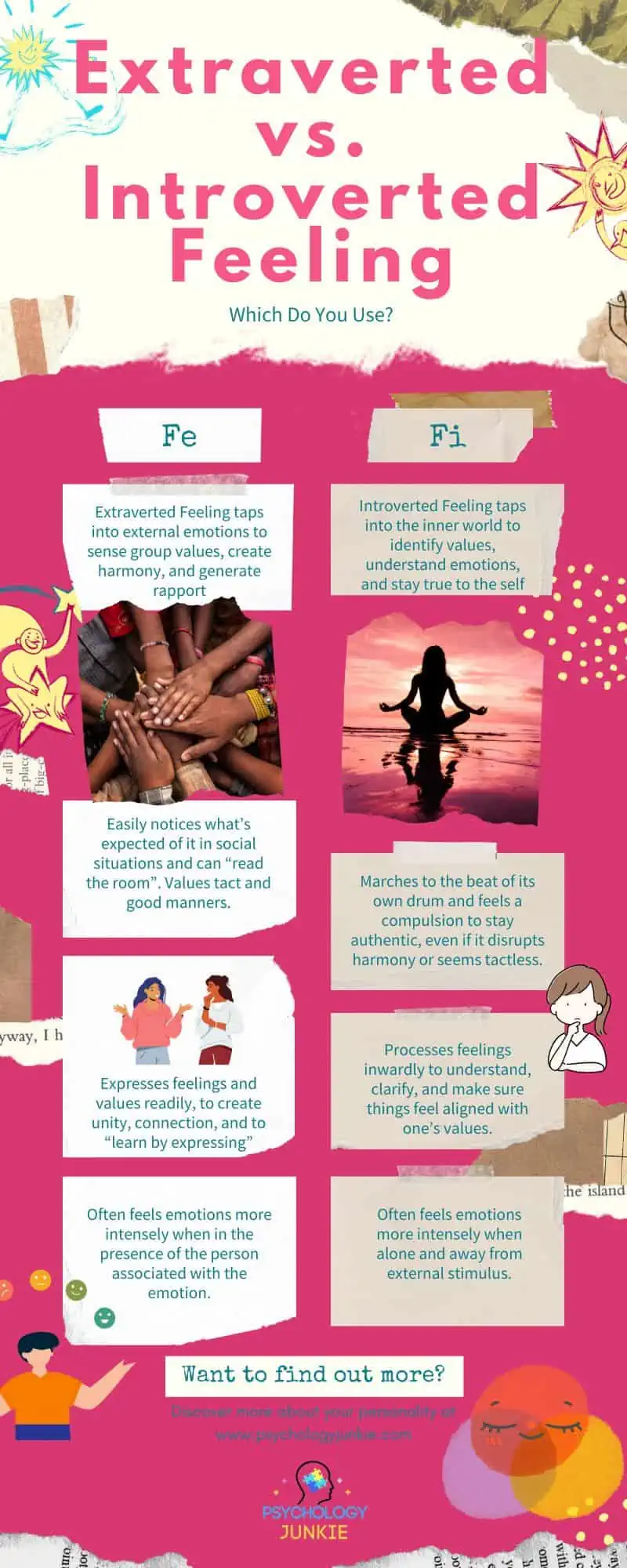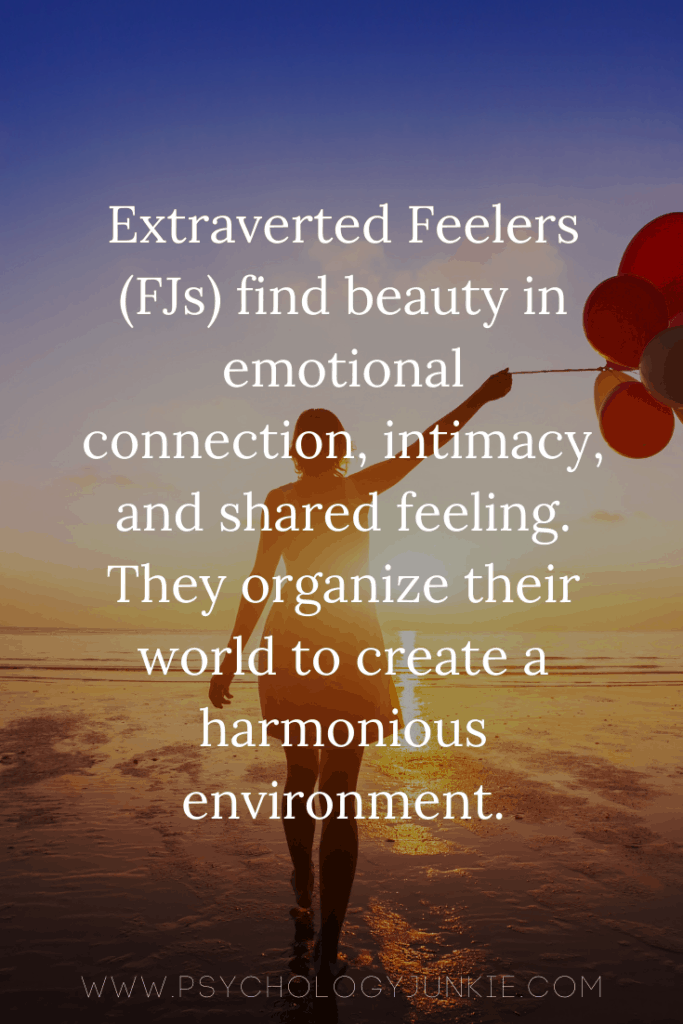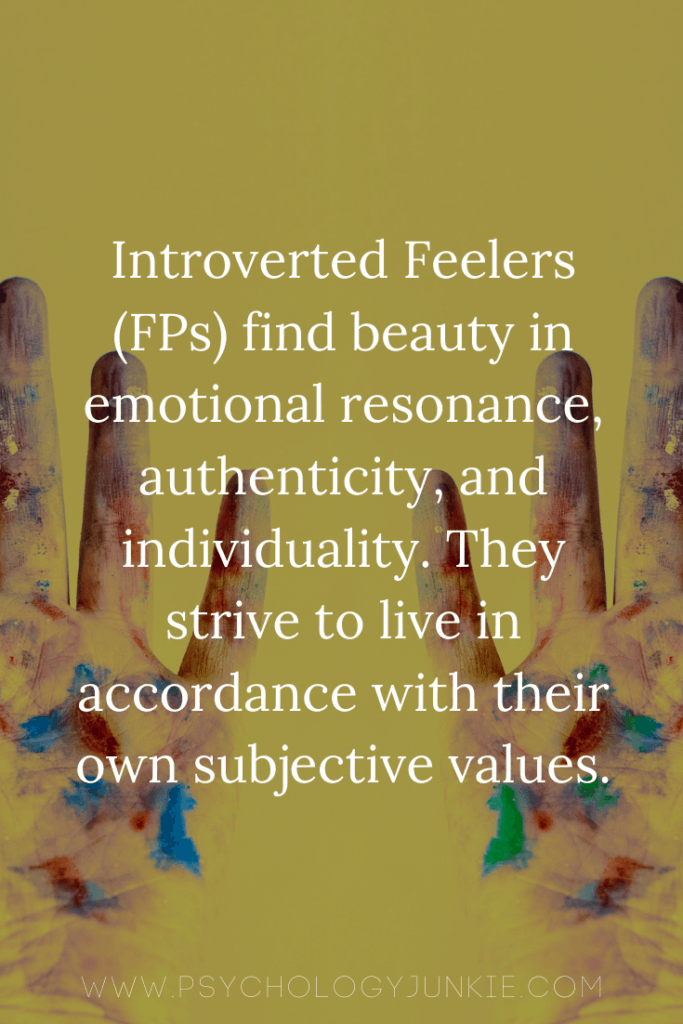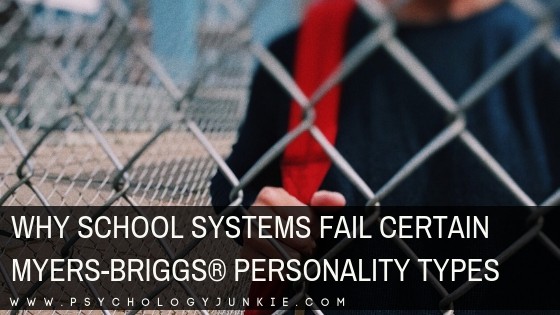The Difference Between Extraverted and Introverted Feeling (Fe vs Fi)
Have you ever wondered what Fe and Fi really mean? Do you find yourself torn between whether you’re an FJ or an FP personality type? Today we’re going to clear up the Fe vs Fi debate with some clear examples of how these two cognitive functions show up. And for beginners who don’t really know what Fe or Fi even are, hang on. This article makes it easy to understand. My goal is that at the end of this article you’ll have a very clear idea of which function resonates with you more.
Estimated reading time: 17 minutes

Table of contents
- Everyone “Feels”
- What’s the difference between thinking and feeling anyway?
- Do You Use Extraverted Feeling (Fe)? Let’s Find Out
- What is Extraverted Feeling (Fe)?
- Fe Users in Communication
- Are Fe Users Emotional?
- Fe Users and Their Thinking Side
- The Struggle of Being a Fe User
- The Unhealthy Fe User
- Are You an Introverted Feeler? How to Find Out
- What Is Introverted Feeling (Fi)?
- Are Fi Users Selfish?
- Fi Users in Appearance:
- The Cognitive Dynamics of Feeling-Perceiving Types
- Fi Users and Emotional Accuracy
- The Unhealthy Fi User
- How to Identify a Fe User or a Fi User:
- Fe vs. Fi: Let Me Know What You Think!
Everyone “Feels”

If you got a “T” result on the MBTI® it means that you prefer thinking over feeling, but you still use both. The same goes for feelers; you still use logic and thinking, but you prefer to assess a situation through feeling before looking at thinking criteria.
Not sure what your personality type is? Take our personality questionnaire here. Or you can take the official MBTI® here.
What’s the difference between thinking and feeling anyway?

Thinking and Feeling are decision-making functions. If you’re a thinker, when you make a decision you analyze pros and cons, causality, and you want logical explanations. If you’re a Feeler, when you make decisions you think first about your values and what’s best for the people involved. You want to maintain harmony and you’ll step inside a situation to understand how it feels to you and to others involved. In contrast, Thinkers step outside of situations to try to see the issue objectively and without emotional attachment or bias. This isn’t to say that thinkers don’t care at all about harmony, and feelers don’t care at all about logic. Your thinking or feeling preference only indicates which option you focus on first.
Do You Use Extraverted Feeling (Fe)? Let’s Find Out
MBTI Types with Dominant Extraverted Feeling:
ESFJ and ENFJ
MBTI Types with Auxiliary Extraverted Feeling:
ISFJ and INFJ
The four types above are going to be the most in tune with Extraverted Feeling.
MBTI Types with Tertiary Extraverted Feeling:
ESTP and ENTP
MBTI Types with Inferior Extraverted Feeling:
ISTP and INTP
The four types above are less in tune with Extraverted Feeling, but still value it.
What is Extraverted Feeling (Fe)?

Extraverted feeling is focused on evaluating the world outside one’s self and organizing the outer world to maintain harmony and interpersonal rapport. FJ personality types (Fe users) have an uncanny way of absorbing other people’s emotions and identifying with them. They want to make others feel at ease, and are very conscious of the emotional temperature of the room.
“Reading the room” is a quality that is exemplified by Extraverted Feeling types. They seem to sense emotional wavelengths and temperature fluctuations. They’ll know right away if there’s a hint of tension or an element of sadness or a spark of joy. Like conductors in an orchestra, they weave elements into the emotional atmosphere to create a shared mood. This mood could be joy, it could be solidarity, it could be comfort. FJs just know how to impact their environment to create a particular mood or a sense of emotional connection or intimacy with others. This is especially true of the ENFJs and ESFJs who have dominant Extraverted Feeling.
Manners, social graces, friendliness, and consideration are the hallmarks of Fe dominant and auxiliary types. They want to create an atmosphere of good-will, comfort, and harmony around them. They care deeply about others and the human race as a whole. Because of this, they find global problems deeply upsetting and try to take everyone’s needs into consideration when they make a decision. They want to change the world and make it a better place, and will often try to bring awareness to others about problems being faced around the world.
Fe Users in Communication
When it comes to conversation, Fe users will readily laugh at jokes, try to get people to interact kindly with each other, and adjust their conversation to the moods of those around them. They will ask questions or disclose information about themselves as a way of helping others feel comfortable or open up. They may master self-depracating humor, making fun of themselves so others will feel at ease around them.
Good manners, politeness, and tact will be readily obvious with Fe users (FJ personality types). If they have criticism to offer, chances are they’ll give you a healthy dose of praise before they suggest any critiques.
Fe users find immense joy in building rapport and a bond of shared feeling. They enjoy supporting and counseling others with emotional or relationship difficulties. Even the introverted INFJs and ISFJs value close friendships and will almost never turn down an opportunity to listen to a friend in need.
Are Fe Users Emotional?
Anyone can be emotional; in fact, some of the most emotionally reactive people I’ve seen have been Thinkers on a bad day. That said, Fe users are more focused on controlling their emotional energy than they are about letting it out unimpeded.
For the Fe user, the impact one has on the emotional atmosphere is the important thing. Therefore, if an FJ type is in a room full of happy people, but they’re feeling sad, they might hold it in and wear a smile. However, if they’re in a room where people are grieving, they will likely let themselves cry because that’s fitting the appropriate mood of the room and they can be free to be authentic. Often, FJs will turn the volume up or down on various facets of their emotional experience in order to positively impact the people they’re with.
All this taken into account, FJ types often need people they can “vent” to without fear of how it’s going to be interpreted. Because FJs have Extraverted Feeling, they need to get their feelings outside of themselves in order to process them fully. Some FJs use journaling, other FJs talk with their friends. During these moments, the FJ can indeed seem emotional. But the minute someone around them sends a signal (verbally or physically) that they are uncomfortable, you’ll quickly see the FJ try to contain themselves and re-adjust the emotional temperature so that they’re not negatively tampering with the emotional space. Of course, everyone has times when they just “don’t care,” and this is just as true for Fe users as it is for any other personality types.
Fe Users and Their Thinking Side
On the inside, Fe users are more analytical than they are emotional. Yes, they have emotions and can feel things very deeply, but their Feeling process is directed outwards. It’s method is to react in real-time to external events, situations, needs, values, and emotions.
Inwardly, the judging process that FJs use is Thinking. Introverted Thinking (Ti) to be exact. So when Feeling-Judgers are interacting with others, or experiencing an emotional change in their environment, they will be in tune with their emotional experience and their values; their feeling side. When Feeling-Judgers are alone, they often go to a more analytical, detached state, because they are now in tune with their introverted functions. For SFJs, the introverted functions would be Introverted Sensing and Introverted Thinking. For NFJs, the introverted functions would be Introverted Intuition and Introverted Thinking.
This doesn’t mean that Feeling-Judgers immediately forget about their feelings or the people they love when they’re alone. It just means that their energy for people, emotions, and values is directed externally and is often more of an interactive process. When they’re alone they may write emails to people they love, send text messages, or watch movies that get them immersed in a character’s emotional experience. But the feeling function is most stimulated by external interaction (watching, receiving, talking, hugging, observing).
When Fe users are mature and healthy, they have balance between their Feeling and Thinking sides. They know how to tap into the emotional experience and express and affirm others, but they also know how to pull in to themselves and process things in a logical, in-depth way as well.
The Struggle of Being a Fe User
Extraverted feeling can feel like a blessing and a curse to those who have it. The ability to absorb emotions can sometimes be difficult in situations where conflict arises. Fe users tend to amass others’ emotions to a point where it can cause severe distress if someone around them is angry or sad. If the people around the FJ type are being selfish, chaotic, mean, or even mopey, the Fe user feels stress over the lack of harmony in the atmosphere. They may try to “fix” it, but find nothing works. If someone is angry at them, the Fe user can become so distressed that they will literally become physically sick.
One crucial way for Fe users to grow is to realize that they are not responsible for everyone else’s feelings. They don’t have to orchestrate the atmosphere all the time. It’s okay for them to step away when the atmosphere is tense and breathe and take some time to reflect and get in touch with themselves. It’s not their fault if the people around them can’t take responsibility for their own feelings.
The exception to a Fe user wanting harmony would be when a Fe user is done with someone because they’ve violated their values one too many times. In these situations, an FJ personality type might cut someone off because they’ve gone too far. This is often called the “door slam”. Any type can door slam, but FJs tend to do this when they’ve given someone one too many chances, and that person has violated their values enough times that they know there’s no long-term benefit to maintaining the relationship.
The Unhealthy Fe User
In the case of unhealthy or immature Fe users, they can socially ostracize or shame people who don’t meet their values. These Fe users can create “Us vs Them” dynamics and make outliers pariah’s of society. The Fe tendency to honor social values can make the unhealthy Fe type reject or even humiliate people who don’t share these same social values or who don’t adopt commonly-accepted social norms. These Fe users may form groups where they orchestrate the values and atmosphere that is present. In these groups, they may gossip about or put down people who don’t “fit in.” This, of course, is an example of an FJ type at their worst, and is not the norm.
Are You an Introverted Feeler? How to Find Out
MBTI Types with Dominant Introverted Feeling:
INFP and ISFP
MBTI Types with Auxiliary Introverted Feeling:
ENFP and ESFP
The above four Myers-Briggs® personality types are the most in tune with Introverted Feeling.
MBTI Types with Tertiary Introverted Feeling:
ISTJ and INTJ
MBTI Types with Inferior Introverted Feeling:
ESTJ and ENTJ
The above four Myers-Briggs® personality types are less in tune with Introverted Feeling, but still value it.
What Is Introverted Feeling (Fi)?

Introverted feeling is a deep, intensive focus on someone’s own personal values, tastes, and emotions. Unlike Extraverted Feeling (Fe), which is largely focused on people outside oneself, Introverted Feeling is focused primarily on one’s own value system. For this reason, it’s often described as “subjective” feeling.
Introverted feelers have a deep set of personal values, morals, feelings and tastes that they live by. They are constantly evaluating whether their choices match up to these values.
“What really matters?” is a question that frequently plays on the mind of the Fi user.
Does what other people think really matter?
Do social values really matter?
“What matters to me?“
For the Fi user, it’s not enough to do something because it’s “polite” or “what other people do.” Fi users need to know that it feels right to them. Being authentic, sincere, and “real” are values that Fi users exemplify in their day-to-day lives. Rather than orchestrating the emotional atmosphere in the environment, like Fe users do, Fi users work on the emotional atmosphere within themselves.
Are Fi Users Selfish?
Some people mistakenly make the assumption that because Fi users focus on inner values and emotions rather than external values and emotions that they are somehow more selfish than Fe users.
Here’s the thing: For Fe users, having a harmonious atmosphere provides fulfillment. You could call this selfish. But it’s just how their personality works. There’s nothing more selfish about Fi than Fe, it’s just a matter of where one’s directing one’s energy to find fulfillment.
For the Fi type, being aligned with one’s inner values provides fulfillment. Sometimes this means going against the grain, being a misfit, and making sacrifices to be true to what one believes is right.
For the Fe type, creating an atmosphere of interpersonal connection around one’s self provides fulfillment. Sometimes this means putting one’s own needs second, absorbing emotions that are messy, or making sacrifices to do what one feels is right.
Neither Fe or Fi are inherently selfish. They just find fulfillment in different things and are willing to make sacrifices to achieve those things.
Fi Users in Appearance:
For the Feeling-Perceiving type, being authentic is key. They might be polite, they might not. Their demeanor might be friendly and warm or it might be cold and prickly. What you’ll get with a Fi type varies from person to person because they aren’t wed to largely adopted social values unless they’ve adopted them as a personal, inner value.
A Fi user might believe in being tactful and polite because they experience inner harmony when other people treat them with tact and politeness. This Fi type might exude an aura of warmth, friendliness, and understanding.
Another Fi user might seem cold, distant, and stoic. They may not have a personal value built around politeness or expressiveness. This doesn’t mean that they want to be mean. They just may not smile if they don’t feel like smiling; they may not laugh if they don’t feel like laughing. You could call this mean, but this same Fi user might go volunteer at a homeless shelter every weekend while a “friendly” person parties on the beach and throws trash everywhere.
Fe users and Fi users can look very different externally, but this doesn’t make them any more or less kind than each other.
In communication, Fi users tend to be very authentic. I know that word comes up a lot, but it’s a core part of the Fi users purpose in life. For the Fi type, they don’t want to express anything that isn’t sincere. They don’t want to act a part in order to smooth things over. These are the kids that won’t apologize if they’re not sorry. They’re the kids who will either defiantly or quietly go to their room and wait hours or even days before the parent succumbs, or they feel a sense of conviction that maybe wasn’t there before. Fi types can be stubborn, but they’re stubborn in defense of what they believe is right or wrong.
Fi users are slow to put anyone in a “box.” If you have been accepted into the Fi user’s inner circle, there is probably nothing you could tell them that would make them reject you unless you violated one of their deeply-held values. Often, Fi users have a love of the outliers and non-conformists of the world. They’re attracted to the underdogs and the “weirdos” because these people are being themselves, regardless of what society thinks. Many Fi users feel compelled to champion the cause of the misfits or outliers that they feel especially called to. They can be quite formidable in defense of what they believe in, passionately fighting against injustice or unfairness in order to help the plight of marginalized people or animals.
The Cognitive Dynamics of Feeling-Perceiving Types
Just as Fe users have an Introverted Thinking side, Fi users have an Extraverted Thinking side. One of the reasons that Fi users tend to look less like stereotypical “feelers” is because the functions they show the world are not feeling.
ISFPs and ESFPs extravert Sensing and Thinking.
INFPs and ENFPs extravert Intuition and Thinking.
Yes, Fi users might have an appearance of sensitivity, emotional understanding, and warmth. But it’s not as natural for FPs (or TJs for that matter) to absorb others’ feelings and try to alter the mood for everyone else’s well-being. Feeling-Perceiving types simply have their feelings and allow others to have their own. To influence the emotional atmosphere might feel manipulative to a Fi-user because it would be robbing themselves or others of their authentic emotional experience.
Extraverted Thinking is the Thinking function that FP types use. It is a unique, outward-focused type of thinking. This cognitive function focuses on meeting goals, using objective logic, weighing pros and cons, and figuring out how to use things to reach a particular end point. Because Extraverted Thinking is less natural for Feeling-Perceivers, it’s not quite as obvious. Instead, you’re more likely to see an FP type’s perceiving function (either Sensing or Intuition).
SFPs might appear very in tune with the physical world. They might dance to the music when no one else is dancing, or strum on a guitar to express their feelings.
NFPs might appear very in tune with the world of the imagination. They might brainstorm ideas with you, help you see alternatives, or come up with creative artistic ideas.
Fi Users and Emotional Accuracy
If you go to a Feeling-Perceiver for support, their Introverted Feeling side might encourage them to listen and put themselves in your shoes. They might imagine “What would it be like if I went through what they’re going through?” This ability to put themselves in others’ shoes is very powerful for Fi users.
Feeling-Perceivers are also deeply focused on emotional accuracy. Just as Thinking-Perceivers want to find logical accuracy and a consistent worldview, Feeling-Perceivers want to have emotional accuracy and a consistent alignment with values. Rather than trying to “solve” your feelings by cheering you up, a Fi user is likely to dive into your feelings with you to try to get an accurate read on what’s really going on for you. At the same time, they try to create space for you to explore those murky, confusing feelings in order to get a thorough and clear understanding of what you’re emotionally experiencing. Fi types are akin to deep-sea emotional divers, looking for nuggets of emotional truth and understanding. The goal is to understand and have accuracy and clarity around the feelings rather than to alter them to a harmonious state.
If you want a lot of output from a Fi user, you might be surprised to see more of their Thinking side show up. They might offer advice, give you some steps to overcoming a problem, or state their opinion quite decidedly. Of course, there will always be an aura of Introverted Feeling around their logic. They might appear more sensitive to the emotional undercurrents of what you’re going through; but their input or comfort will have a tinge of that Extraverted Thinking logic and directiveness as well.
The Unhealthy Fi User
When Fi users (FP personality types) are unhealthy, they can become overly absorbed in their inner world and the feelings and judgments that come from within. They may link themselves to a way of life and demonize people who are outside of that way of life. For example, a Fi user might become a vegan, but instead of seeing other perspectives and still being friendly with people who are vegetarian or meat-eating, they may cut ties with them altogether and ascribe all kinds of negative intent upon them.
Unhealthy Fi users may also retreat from society and dream of ideal worlds that they wish were real. These Fi users might struggle to find their community or meaningful friendships, becoming disappointed with anyone who doesn’t match the ideal that they have in their own mind.
How to Identify a Fe User or a Fi User:
Fe Users – The Good:
- Polite
- Friendly
- Expressive
- Empathetic
- Observant
- Relating
- Nurturing
- Affirming
- Comforting
Fe Users – The Bad (what you might see in an unhealthy/imbalanced Fe user):
- Insincere
- Meddling
- Self-forgetting
- Co-dependent
- Manipulative
- Creates “Us vs Them” dynamics
- Gossiping or ostracizing
- Illogical
Fi Users – The Good:
- Sincere
- Champion of the misfits
- Attentive to motives
- Accepting
- Empathetic
- Individualistic
- Stand up for their beliefs
- Sensitive
Fi Users – The Bad (what you would see in an unhealthy/imbalanced Fi user)
- Overly-sensitive
- Self-centered
- Demonizing
- Overly-reclusive
- Unproductive
- Illogical
Fe vs. Fi: Let Me Know What You Think!
I hope this has helped you identify whether you’re an FJ or an FP personality type . In some ways they are very similar; both are concerned with values and harmony. In other ways they are different; one is concerned with outer values and emotions, and the other is concerned with inner values and emotions. They both have their strengths and weaknesses, not one is better than the other.
What about you?
Are you an extraverted feeler or an introverted feeler? What experiences have you had using feeling? What are some of the joys and struggles you deal with with your feeling function? Let me know in the comments!
Find out more about your personality type in our eBooks, Discovering You: Unlocking the Power of Personality Type, The INFJ – Understanding the Mystic, The INFP – Understanding the Dreamer, and The INTJ – Understanding the Strategist. You can also connect with me via Facebook, Instagram, or Twitter!

Subscribe to Our Newsletter

Want to discover more about personality type? Get the inside scoop with Susan Storm on all things typological, along with special subscriber freebies, and discounts on new eBooks and courses! Join our newsletter today!










I’m an INFP, yet find myself identifying more with the Fe. There are aspects of the Fi that apply, too. But I’ve often referred to myself as an emotional sponge, and I will do anything to avoid conflict. I’m sure I have some values that matter to me. They are there, immovable, so why bother fighting for them. Nobody can take them away.
I agree with Kay about avoiding conflict! But we’re less likely to do the Fe thing of harmonising the group, but just look for a way to escape.
Also as an INFP I’ve often been desperate to find a place to unpack my emotions, this is what started me journalling. But finding a person I thought was interested enough to listen was hard.
I loved this line “They are constantly evaluating whether their choices match up to these values. ” Haven’t got past that even past 60!
Also “Fi users are slow to put anyone in a “box”. If you have been accepted into the Fi user’s inner circle, there is probably nothing you could tell them that would make them reject you unless you violate one of their deeply-held values.” Though it does mean that in later years one is more cautious letting people in to that “inner circle”.
Thanks Susan!
amazing article!!! it helped me so much understandings the reasons why feelers act so differently!!! many things that i suspected about others now make perfect sense!!!
Awesome article, thanks for clearing this up!!!!
Glad you enjoyed it!! Thanks for reading 🙂
Well, firstly, I have to commend Susan Storm simply because she’s awesome at this.
I’m an INFP I’ve noticed traces of both Extraverted Feeling(Fe) and Introverted Feeling(Fi) within me. I’ve found myself being more aligned with the Introverted Feeling of course, but I’ve found myself swallowing my inner values sometimes for the sake of others and how it makes them feel.
In those moments I do hate what I’m doing but I think making others happy is worth it.
I am definitely an Introverted Feeler! As someone who misidentified as an xNTP before, it was very obvious that I was mistyped. Learning about the cognitive functions (especially the weaker ones and the shadow) is certainly essential for finding one’s true or best fit type. Thank you for this clear distinction between Fe and Fi! ~ ENTJ enneagram 784.
I am deeply confused about my type. I’ve narrowed it down to either ESFJ or ENFP, and I can’t for the life of me understand this part of myself.
I once thought I was Fe-Ne, in terms of the ENTP grip, but I may be an ESFJ because of the dominant Fe. However, I also use Ne I’d say predominantly in my interaction with the world and others. I’ve heard it described as a servant function for ESFJs, like it simply helps with seeing people more broadly and seeing possibilities in relation to people. But I don’t know. I used Ne for its own sake, bizarre humour, puns, internal imaginative abstractions in tune with the outside input, strange serendipitous occurrences related to the external environment. Fi or Fe guides my morals, but I’m also deeply nostalgic and sentimental. Like I have my own internal library of scents and memory, related to sounds and music, too. I definitely have synesthesia. But I focus on other people’s feelings predominantly and absorb them. Is this ENFP? Doesn’t sound like it. But ESFJ doesn’t really fit either because I really don’t feel comfortable calling myself a sensor when I’m a bizarre, abstract thinker that learns from the top down with principles first. Abstract principles first. I often lack a filter, too.
Any insight here? I’ll often leave groups but feel guilty about it. I just think, screw this. I’m out. I’m leaving because my values aren’t being respected and I can’t assimilate. I tend to just… Leave. Then feeling guilty because I had an obligation I shirked. Maybe that’s an Fi value of mine. I have no idea.